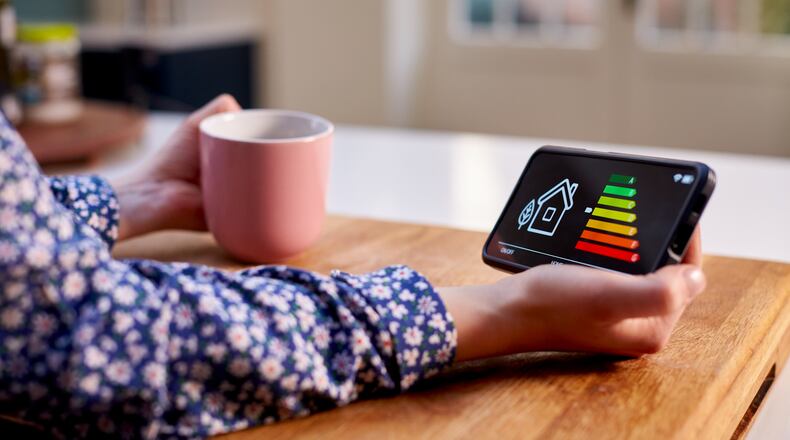When you’re buying the following products, look for a blue ENERGY STAR label. This indicates the product has met the federal government’s standards to be labeled as more energy-efficient compared to products that don’t have the label. ENERGY STAR products are available in categories including:
- Air cleaners
- Air-source heat pumps
- Boilers
- Ceiling fans
- Central air conditioners
- Clothes dryers and washers
- Decorative light strings
- Dehumidifiers
- Dishwashers
- Ductless heating and cooling
- Electric cooking products
- Freezers
- Furnaces
- Geothermal heat pumps
- Light fixtures
- Refrigerators
- Smart thermostats
- Ventilation fans
- Whole home tankless gas water heaters
You can visit EnergyStar.gov to search for products and potentially get rebates and special offers when you purchase ENERGY STAR products.
Unplug items not in use
“Vampire” energy is electricity that’s used by products that are plugged in, but not in use. Even when products are not in use, if they’re on standby mode, they’re consuming idle load electricity that adds up on an electric bill. According to the Natural Resources Defense Council, up to one-fourth of home energy use is due to energy “vampires”.
Encourage your family to turn off all devices when they’re not in use. Using an advanced power strip makes it easier to turn them all off at once. If you want to go a step further, unplug a device from an outlet altogether when it’s not in use.
For items that are more convenient to keep plugged in, use timers to automatically power down machines when that option’s available. Also, use power-saving settings for electronics like TVs and video games, so they’ll deactivate automatically when they’re not in use.
Optimize your home insulation
Optimal home insulation can help you live more comfortably and can help you save up to 15% on electricity bills, according to the U.S. Environmental Protection Agency. Insulation helps reduce heat flow throughout your home, so it’s easier to maintain your optimal temperature in both winter and summer months.
You can also keep more heat and cold air in with proper air sealing. According to the U.S. Department of Energy, applying air-sealing techniques like caulking and weatherstripping to seal cracks and openings can provide a return on investment in less than a year.
Mind the thermostat
Heating and air conditioning costs can significantly impact your energy bill. According to Energy Choice Ohio, turning the thermostat down one degree in the winter could save you up to 3% on your heating bill, while raising the temperature by five degrees for 8 hours in the summer can decrease cooling costs by up to 5%.
A smart thermostat can be programmed to adjust temperatures based on the schedule you set. They’re also handy if you forget to adjust the temperature before you leave home, so you can still change the temperature remotely. If you’re going to be away from home for several hours or more, raise or lower the temperature to conserve energy and save money.
Inspect your appliances
Inefficient appliances could be working harder and using more energy compared to ones that work optimally. Conduct regular maintenance inspections according to the appliances’ recommendations, especially for large systems like heating and air conditioning. It may pay off to replace outdated systems altogether with an ENERGY STAR appliance.
Also, do a home check for leaky toilets and faucets, which could waste hundreds of gallons of water a week. You can also swap out smaller items, like light bulbs and showerheads, for energy-conserving options.
About the Author

